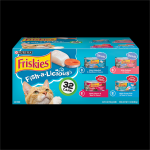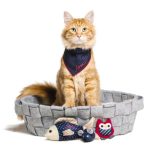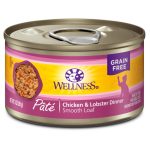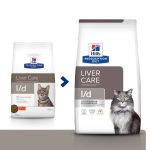Unveiling The Benefits And Drawbacks Of Grain Free Cat Food: Your Guide To Making The Right Choice!
Grain Free Cat Food Pros and Cons
Introduction
1 Picture Gallery: Unveiling The Benefits And Drawbacks Of Grain Free Cat Food: Your Guide To Making The Right Choice!

Dear Cat Lovers,

Image Source: hepper.com
Welcome to this informative article about the pros and cons of grain-free cat food. As cat enthusiasts, we all want the best for our furry friends, and their nutrition plays a crucial role in their overall health and well-being. In recent years, grain-free cat food has gained popularity, but it is important to understand both the advantages and disadvantages before making a decision. In this article, we will explore the various aspects of grain-free cat food to help you make an informed choice for your beloved feline companion.
Now, let’s dive into the world of grain-free cat food and discover its pros and cons!
What is Grain-Free Cat Food?
Grain-free cat food refers to a type of diet that does not contain any grains such as wheat, corn, or soy. Instead, it focuses on providing essential nutrients through alternative ingredients like meat, fish, vegetables, and fruits. The main idea behind grain-free cat food is to mimic a more natural diet that cats would consume in the wild.
Who Should Consider Grain-Free Cat Food?
Grain-free cat food is often recommended for cats with specific dietary needs or sensitivities. Cats with grain allergies, digestive issues, or certain health conditions can benefit from a grain-free diet. Additionally, some cat owners choose grain-free cat food as a preventive measure to promote optimal health and reduce the risk of potential allergies or intolerances.
When to Consider Grain-Free Cat Food?
Your veterinarian may recommend grain-free cat food if your feline companion is experiencing symptoms such as skin irritations, excessive shedding, gastrointestinal problems, or recurrent ear infections. It is important to consult with your veterinarian before making any dietary changes to ensure it aligns with your cat’s specific needs.
Where Can You Find Grain-Free Cat Food?
Grain-free cat food is widely available in pet stores, online retailers, and even some grocery stores. It is important to read the labels carefully and choose reputable brands that prioritize quality ingredients and adhere to industry standards. Your veterinarian can also provide recommendations based on your cat’s individual requirements.
Why Choose Grain-Free Cat Food?
One of the main reasons cat owners opt for grain-free cat food is the belief that it closely resembles the natural diet of cats in the wild. This diet typically consists of high-quality animal protein, healthy fats, and a lower carbohydrate content. Advocates of grain-free cat food claim that it can lead to various benefits, including improved digestion, increased energy levels, healthier skin and coat, and even weight management.
How to Transition to Grain-Free Cat Food?
When transitioning your cat to a grain-free diet, it is essential to do so gradually. Start by mixing a small amount of the new grain-free food with your cat’s current food and gradually increase the proportion over a week or two. This gradual transition allows your cat’s digestive system to adjust to the new diet without causing any digestive upset.
Advantages of Grain-Free Cat Food
1. Improved Digestion: Many cats with grain sensitivities experience digestive issues such as vomiting, diarrhea, or bloating. Switching to grain-free cat food can alleviate these symptoms and promote better digestion.
2. Allergy Management: Cats with grain allergies may exhibit symptoms like itchy skin, excessive scratching, or ear infections. Grain-free cat food can help manage these allergies and provide relief.
3. Weight Management: Grain-free cat food often has a higher protein content and lower carbohydrate levels. This can help maintain a healthy weight for your cat and prevent obesity-related health issues.
4. Enhanced Skin and Coat: The high-quality protein sources in grain-free cat food can contribute to a healthier and shinier coat. It can also reduce shedding and minimize skin irritations.
5. Increased Energy Levels: Cats on grain-free diets may experience increased energy levels and overall vitality. This can be especially beneficial for cats that are more active or have a higher metabolism.
Disadvantages of Grain-Free Cat Food
1. Cost: Grain-free cat food can be more expensive compared to traditional cat food options. The higher quality ingredients and specialized formulas contribute to the increased cost.
2. Limited Variety: Grain-free cat food may have a narrower range of options compared to traditional cat food. This can limit the variety of flavors and textures available for your cat.
3. Potential Nutritional Imbalances: Some grain-free cat food formulas may lack certain essential nutrients or have imbalanced ratios. It is important to choose a well-formulated grain-free cat food that meets the nutritional requirements of your cat.
4. Transition Challenges: Some cats may be resistant to change and find it challenging to transition to a new diet. Patience and gradual introduction are key to ensuring a successful switch.
5. Individual Sensitivities: While grain-free cat food can be beneficial for many cats, it is not a one-size-fits-all solution. Each cat is unique, and some may have sensitivities or allergies to specific ingredients other than grains.
Frequently Asked Questions (FAQs)
1. Is grain-free cat food suitable for all cats?
Grain-free cat food is not necessary or suitable for all cats. It is best to consult with your veterinarian to determine if it is the right choice for your cat’s specific needs.
2. Are there any potential risks associated with grain-free cat food?
While grain-free cat food can offer benefits, there have been concerns regarding a potential link between grain-free diets and a heart condition called dilated cardiomyopathy (DCM). However, more research is needed to establish a definitive connection.
3. Can kittens be fed grain-free cat food?
Kittens have specific nutritional requirements for their growth and development. Consult with your veterinarian to determine the most appropriate diet for your kitten.
4. How long does it take for a cat to adjust to a grain-free diet?
The adjustment period can vary for each cat. It may take a few days to a couple of weeks for your cat to fully adjust to a new grain-free diet.
5. What should I do if my cat experiences digestive issues after switching to grain-free cat food?
If your cat experiences digestive issues after transitioning to grain-free cat food, consult with your veterinarian. They can provide guidance and recommend suitable alternative options.
Conclusion
After exploring the pros and cons of grain-free cat food, it is important to remember that every cat is unique. What works for one cat may not work for another. Before making any dietary changes, consult with your veterinarian to ensure you are making the best decision for your feline companion. Whether you choose grain-free cat food or not, prioritizing a balanced and nutritionally complete diet will contribute to your cat’s overall health and happiness.
Final Remarks
The information provided in this article is intended for educational purposes only and should not replace professional veterinary advice. Always consult with your veterinarian before making any changes to your cat’s diet or addressing specific health concerns. The health and well-being of your cat should always be the top priority.
This post topic: Cats



